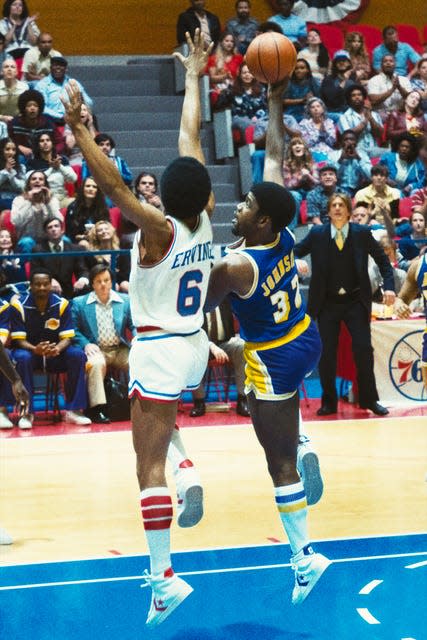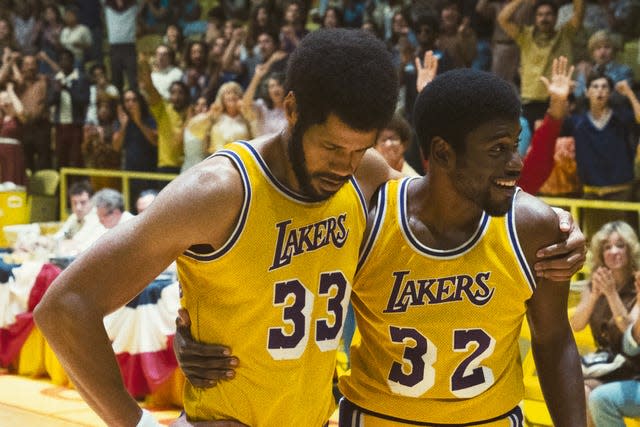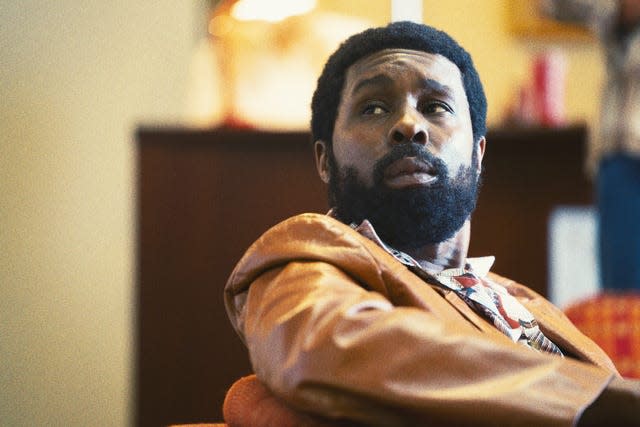Fact-checking 'Winning Time' finale: Did Haywood plot to kill Lakers? Did Magic Johnson steal MVP?
- Oops!Something went wrong.Please try again later.
- Oops!Something went wrong.Please try again later.
- Oops!Something went wrong.Please try again later.
- Oops!Something went wrong.Please try again later.
The final buzzer has sounded on HBO's "Winning Time: The Rise of the Lakers Dynasty," showing Earvin "Magic" Johnson (Quincy Isaiah) heroically carrying the "Showtime"-era Lakers to the 1980 NBA championship.
The HBO series focused on Johnson, the ascending superstar point guard, legendary center Kareem Abdul-Jabbar (Solomon Hughes) and team owner Jerry Buss (John C. Reilly) completed its spotlight-grabbing 10-episode first season Sunday.
Controversy has followed the "Winning Time" success. Johnson, Abdul-Jabbar (who called the series "deliberately dishonest") and former Laker superstar and general manager Jerry West have criticized the show's portrayals. West even threatened legal action through a letter from his lawyer, demanding a retraction from HBO and producer Adam McKay, while calling Jason Clarke's rage-filled performance a "malicious assault."
HBO responded in a statement that the series, based primarily on Jeff Pearlman's 2013 book "Showtime: Magic, Kareem, Riley, and the Los Angeles Lakers Dynasty of the 1980s," had been "fictionalized in part for dramatic purposes."
Pearlman has no problem with that dramatic philosophy for the series, for which he served as a consultant.
"Look at any TV show or movie based on a sports event that really happened, whether it's '42,' 'We Are Marshall,' 'A League of Their Own,'" he says. "There are dramatic flourishes and leaps. That's what this media is. This isn't a documentary."
HBO has already renewed "Winning Time" for a second season and optioned Pearlman's follow-up book, 2020's "Three-Ring Circus: Kobe, Shaq, Phil, and the Crazy Years of the Lakers Dynasty," suggesting the next installment will focus on the late '90s-early 2000s Kobe Bryant-Shaquille O'Neal era.
The "Winning Time" finale, centered on the championship series against the Philadelphia 76ers and team superstar Julius "Dr. J." Erving, continues weaving truth with dramatic license.
Here's the finale breakdown.
Sky hooks and an epic comb-over: The casting magic of HBO's 'Winning Time' Lakers

Johnson magically stepped up to replace Abdul-Jabbar at center in the pivotal Game 6
The 7-foot-2-inch Abdul had led his team through the finals, gutting out a MVP-worthy Game 5 victory despite a severely injured ankle. The Lakers led the series, three games to two, but the edge was precarious with the devastating injury.
The 6-foot-9-inch Johnson rose to the occasion and stepped into the center position for Game 6.
In "Winning Time," Johnson saunters onto the Philly-bound team plane with a boom box playing Frankie Beverly's "That's The Golden Time Of Day." He literally and symbolically takes Abdul-Jabbar's vacant plane seat. "Have no fear, ... Magic Johnson is here," he says.
This scene is described in "Showtime" and recounted in a March Fubo TV interview by Lakers guard Michael Cooper, who noted the scene signified Johnson stepping up to the next level with his leadership and performance.
"That changed the whole tone," Cooper said. "We went to Philadelphia ... and won a championship."
The suggestion in "Winning Time" that it was Johnson's idea to start as center is dramatic license. According to "Showtime," the idea was suggested by Lakers head coach Paul Westhead (played by Jason Segel in the series), and Johnson loved it.
Magic even jumped center in the game's opening tip to make a statement, as seen in the episode. Eventually playing all five positions, his gutsy, iconic Game 6 featured 42 points, 15 rebounds and seven assists, and earned the Lakers the championship crown.

Did Magic swipe Kareem's finals MVP award?
"Winning Time" shows a locker room-bound Johnson agreeing to take the finals MVP award instead of Abdul-Jabbar – on the strong suggestion of David Stern, the league's executive vice president for legal affairs (and future commissioner). The scene is a fictionalized account of the debate surrounding Johnson's finals MVP win.
Abdul-Jabbar was the series' statistical MVP winner through his heroic Game 5. But he missed the finals due to his ankle injury.
In his memoir, "Kareem," Abdul-Jabbar cites sportswriter Bill Livingston, who publicly said the voting NBA writers had originally chosen Abdul-Jabbar as finals MVP – but the group was pressured "either by the network (CBS) or the league" to change the vote. Johnson had no say in the matter. But with Abdul-Jabbar stuck watching the game from his Los Angeles home, giving the award to an empty chair was bad TV.
"My not being there in Philadelphia to receive the trophy on camera was a major inconvenience as far as the television people were concerned," Abdul-Jabbar wrote, making it clear he only cared about winning the game. He did not begrudge Johnson for the win, writing, "the outcome was never a problem between Magic and me."

Did forward Spencer Haywood plot to kill the Lakers?
"Winning Time" features Spencer Haywood (Wood Harris) plotting to kill the Lakers after the team voted to kick out the troubled forward because of his cocaine use.
In reality, Haywood wrote in a 1988 account in People magazine, he blamed Westhead, who had actually kicked Haywood off the team following Game 3.
"I turned all my anger toward Westhead, who I felt had snatched it from me. I left the Forum and drove off in my Rolls that night thinking one thought – that Westhead must die," Haywood wrote.
"In the heat of anger and the daze of coke" Haywood said he phoned a Detroit gangster friend and devised a plan to tamper with the brakes on Westhead's car. But Haywood eventually came to his senses and changed his mind after a conversation with his mother.
"She got me straight," he wrote.
Haywood retired and became an advocate against drug use. The pioneering player – who won a Supreme Court case that overruled the NBA's rule that a player couldn't be drafted until four years after graduating high school – was inducted into the Naismith Memorial Basketball Hall of Fame in 2015.
Westhead said in "Showtime" that Haywood visited him during his drug recovery "to ask for my forgiveness" for the plot.
"Spencer, of course, I forgive you," Westhead recalled responding. "It's great to see you. Because if it had worked, I wouldn't be seeing you."
This article originally appeared on USA TODAY: 'Winning Time' fact check: How Magic Johnson took MVP in heroic finale

